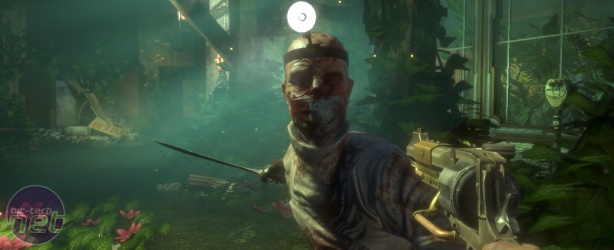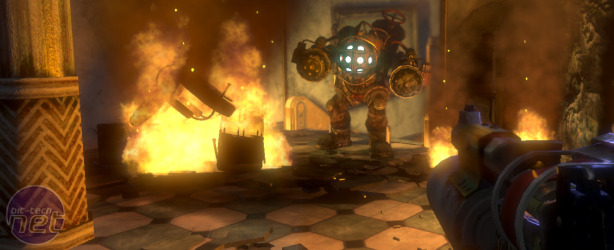
BioShock is a Classic
It would take a whole article to go through all the possible plasmid strategies, but the point is that while the combat does devolve into a corridor shooter in the final stages, the bulk of the game is a lot more sandboxy than it’s given credit for. You can just use the boring machine guns to brute force your way through, but you also have the option to spring ingenious traps with your plasmids. Use them wisely and you can even bring down Big Daddies with ease.Ah, the Big Daddies. They stomp around the level, creaking, moaning, roaring like Steampunk goliaths, heavily armoured and toting what can only be described as a 'giant bloody drill'. They, like Rapture, are iconic and were featured in pretty much every marketing shot pre-release. They’ve been hyped and built up over the course of a thousand reviews.
In reality though, the Big Daddies were actually pretty rubbish. Sure, they looked great - fitting the Rapture aesthetic beautifully, but to fight they were torturous. You could plan against them to an extent; set up a few security traps, proxmity mines, etc, but they were so tough that it generally wound down to you shooting and running backwards no matter what - most plasmids being barely effective against their steel shell. The only sure-fire plan was to fight one next to a Vita-Life respawning chamber – another huge hole in BioShock’s gameplay.
What was great about the Big Daddies though was their relationships with the Little Sisters. These little girls again hit the vibe of familiar but alien; they were undoubtedly small children, but at the same time they had glowing eyes, and were skipping around singing while extracting a red viscous from mutilated corpses. Their relationship with the Big Daddies was truly interesting, even if it is only properly explored in the sequel, and helped transform giant metal monstrosities into caring, gentle giants.
Of course, it’s not a happy kinship so much as it is a deeply tragic one. Little Sisters collect the plasmid-creating Adam and the only way to get it is by seizing it from them violently. The Big Daddies have this weirdly charming attachment to their Little Sisters, but that only really means that you’re going to have to kill them to get to the girls. It’s definitely an interesting way to toy with the player, with developers essentially saying “This is cute, now destroy it” before making you decide what to do with the leftover little girl.
The choice is either to kill the Little Sister and harvest lots of Adam which is very, very evil, or let her survive and harvest less Adam which is very, very good. Disappointingly, in the long run, it makes no difference which way you go - you end up with roughly the same stuff either way and there are no real repercussions from doing one or the other, apart from the end cutscene. One casts you as a saint, the other as Satan. It's a gross oversimplification of what could have been an emotional weight on the player, standing out as one of BioShock’s weakest points by far – even just from the way it is presented. Press A to Kill, B to Not Be A Bastard.
Of course, before the end is The Twist – and, let’s be honest, "Would you kindly" was amazing. Incredible. Those three words achieved so much. They provided a narrative twist to rival the best of them while simultaneously deconstructing the FPS genre and providing a commentary on videogames in general. How many shooters do you know that have actually used your own assumptions about what FPS protagonists should be against you in that way?
What made the Twist so brilliant is simply that that confrontation with Ryan forced players to question control. "A man chooses, a slave obeys!" yells Ryan as you clobber him to death with a golf club at his own order. There are people that argue that this is all irrelevant because you never had chance to disobey, and they have a point, but I can't help but feel that they are being too finicky. Bioshock was making a point, and it did it very well.
Then it does a u-turn. After pointing out the flaws of people blindly following objectives because they are told to, it asks you to follow more objectives even after you are cleared of your 'brainwashing', this time to tackle Fontaine, Ryan’s rival. From this point onwards, yes, BioShock is a slog. It simply runs out of steam. It's said what it had to say and it starts descending into the very gaming tropes it was mocking in order to extend the story.
Most daminingly of all, the descent doesn't even let up at any point. It continues right until the final boss fight where Bioshock takes a nose dive and crashes harder than the plane at the start. What was a smart shooter hits a monumentally moronic low by asking you to stop fighting against philosophies and turn your attention to killing a giant red, bullet absorbing monster who recharges at a machine. He's a boring end to a dull second half, almost undermining everything that the game worked so hard to build up earlier.
Bioshock is great, there can be no doubt about that. Every gamer should experience it at least once just to watch it masterfully set up that confrontation with Ryan. It's an important game, one of the first that's actually making a statement about modern gaming as a whole, and that's why it shouldn't be forgotten. Sure, the combat can be a bit uninspired at times, and the second half is as 'gamey' as they come, but to miss out on Rapture, The Little Sisters and That Twist would be unthinkable even in spite of the way the brilliance is peppered with faults.

MSI MPG Velox 100R Chassis Review
October 14 2021 | 15:04











Want to comment? Please log in.